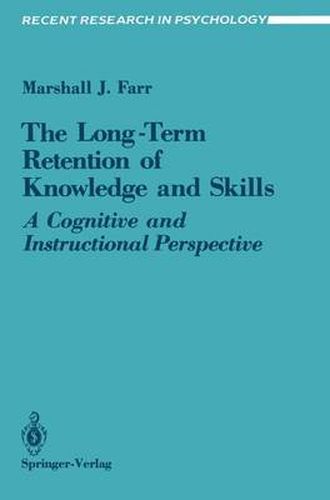Readings Newsletter
Become a Readings Member to make your shopping experience even easier.
Sign in or sign up for free!
You’re not far away from qualifying for FREE standard shipping within Australia
You’ve qualified for FREE standard shipping within Australia
The cart is loading…






This title is printed to order. This book may have been self-published. If so, we cannot guarantee the quality of the content. In the main most books will have gone through the editing process however some may not. We therefore suggest that you be aware of this before ordering this book. If in doubt check either the author or publisher’s details as we are unable to accept any returns unless they are faulty. Please contact us if you have any questions.
A. INTRODUCTION AND BACKGROUNDl,2 This report reviews and interprets research on the nature and magnitude of the effects of those factors which influence how well knowledge and skills (K&S) are retained over relatively long periods of nonuse. Our interest lies in the kinds of knowledge domains and skills that military personnel must master to function effectively on their jobs. The practical concern impelling this study is that K&S degradation or loss (which we will refer to as decay ) can and does occur, often and severely enough, to jeopardize military preparedness. There are occasions in all the military services when personnel who have just completed their training do not receive an opportunity to practice or use their new capabilities for weeks or months. In the case of reservists who may be called back to active duty, the period of nonuse of relevant military job skills may be counted in terms of years. B. OBJECTIVES The overall objective is to critically analyze the relevant scientific literature which relates the processes involved in learning to those of memory, taking into account the characteristics of the learner and the learning tasks. More specifically, we have focused on the following sub-objectives: 1. Identify, describe and rank the influence and the interactions of the important major variables that affect long-term retention (LTR); 1 I am indebted to Dr. Jesse Orlansky, Institute for Defense Analyses, for his encouragement and guidance through all phases of this report.
$9.00 standard shipping within Australia
FREE standard shipping within Australia for orders over $100.00
Express & International shipping calculated at checkout
This title is printed to order. This book may have been self-published. If so, we cannot guarantee the quality of the content. In the main most books will have gone through the editing process however some may not. We therefore suggest that you be aware of this before ordering this book. If in doubt check either the author or publisher’s details as we are unable to accept any returns unless they are faulty. Please contact us if you have any questions.
A. INTRODUCTION AND BACKGROUNDl,2 This report reviews and interprets research on the nature and magnitude of the effects of those factors which influence how well knowledge and skills (K&S) are retained over relatively long periods of nonuse. Our interest lies in the kinds of knowledge domains and skills that military personnel must master to function effectively on their jobs. The practical concern impelling this study is that K&S degradation or loss (which we will refer to as decay ) can and does occur, often and severely enough, to jeopardize military preparedness. There are occasions in all the military services when personnel who have just completed their training do not receive an opportunity to practice or use their new capabilities for weeks or months. In the case of reservists who may be called back to active duty, the period of nonuse of relevant military job skills may be counted in terms of years. B. OBJECTIVES The overall objective is to critically analyze the relevant scientific literature which relates the processes involved in learning to those of memory, taking into account the characteristics of the learner and the learning tasks. More specifically, we have focused on the following sub-objectives: 1. Identify, describe and rank the influence and the interactions of the important major variables that affect long-term retention (LTR); 1 I am indebted to Dr. Jesse Orlansky, Institute for Defense Analyses, for his encouragement and guidance through all phases of this report.